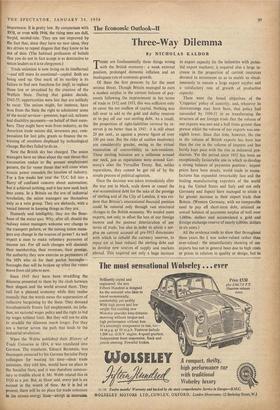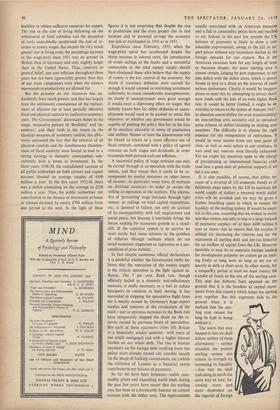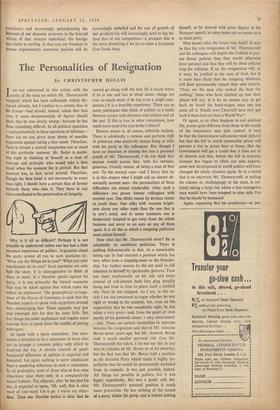The Economic Outlook—II
Three-Way Dilemma
By NICHOLAS KALDOR THERE are 'fundamentally three things wrong with the British economy : a weak external position, prolonged domestic inflation and an inadequate rate of economic growth.
Of these the first presents by far the most serious threat. Though Britain managed to earn a modest surplus in the current balance of pay- ments following the improvement in her, terms of trade in 1952 and 1953, this was sufficient only to cover the net outflow of capital. Nothing was left over to add to the gold and dollar reserves or to pay off our vast sterling debt. As a result, the proportion of sight-liabilities covered by re- serves is no better than in 1945: it is still about 20 per cent., as against a prewar figure of over 100 per cent. But the risks of sudden insolvency are considerably greater, owing to the virtual restoration of convertibility to non-residents. These sterling balances are a millstone around our neck, just as reparations were around Ger- many's after the Versailles Treaty. But, unlike reparations, they cannot be got rid of by the simple process of political agitation.
Once the decision was taken immediately after the war not to block, scale down or cancel the war-accumulated debt for the sake of the prestige of Sterling and of the City of London, it was evi- dent that Britain's international financial position could be restored only through vast structural changes in the British economy. We needed more exports, not only to offset the loss of our foreign income and the postwar deterioration of our terms of trade, but also in order to attain a sur- plus on current account of pre-1913 dimensions with which to rebuild the currency reserves, to repay (or at least reduce) the sterling debt and to develop new sources of supply and markets abroad. This required not only a huge increase in export capacity (in the industries with poten- tial export markets); it required also a large in- crease in the proportion of current resources devoted to investment so as to enable us simul- taneously, to sustain a large export surplus and a satisfactory rate of growth of productive capacity.
These were the broad objectives of the `Crippsian' policy of austerity; and, whatever its shortcomings may have been, that policy had succeeded by 1950-51 in so transforming the structure of our foreign trade that the volume of our exports was one and a half times greater than prewar whilst the volume of our imports was one- eighth lower. Since that time, however, the rise in the volume of British exports has been less than the rise in the volume of imports and has barely. kept pace with the rise in industrial pro- duction. Yet the period since 1952 has been an exceptionally favourable one in which to develop a strong balance of payments position : import prices have been steady, world trade in manu- factures has expanded remarkably fast and the leading manufacturing exporters of the world (e.g. the United States and Italy and not only Germany and Japan) have managed to attain a far greater increase in their export trade than Britain. (Western Germany, with no comparable need to pay off short-term debt, attained an annual balance of payments surplus of well over 1,000m. dollars and accumulated a gold and foreign exchange reserve of nearly 6,000m. dollars in six years.) All the evidence tends to show that throughout these years the £ was under-valued rather than over-valued : the unsatisfactory showing of our exports has not in general been due to high costs or prices in relation to quality or design, but to inability to release sufficient resources for export. The rise in the cost of living following on the withdrawal of food subsidies and the decontrol of rents undoubtedly accelerated the rate of in- crease in money wages. But despite the very much greater rise in living costs, the percentage increase in the wage-level since 1951 was no greater in Britain than in Germany and only slightly larger than in the United States. Thus, contrary to general belief, our cost inflation throughout these years has not been appreciably greater than that of our main competitors even when the relative movements in productivity are allowed for.
But the pressure on our resources has un- doubtedly been much greater: and that has largely been the unforeseen consequence of the replace- ment of effective (or at least partially effective) fiscal and physical controls by ineffective monetary ones. The Governments' doctrinaire belief in the magic restorative powers of 'flexibility' and 'in- centives,' and their faith in the return to the classical weapons of monetary control, has effec- tively concealed the fact that the removal of all physical controls and the simultaneous abandon- ment of fiscal austerity were bound to lead to a strong upsurge in domestic consumption con- currently with a boom in investment. In the three years 1948-50, the consolidated account of all public authorities on both current and capital account showed an average surplus of £450 million a year. In the five years 1952-56 there was a deficit amounting on the average to £220 million a year. Thus, the public authorities' net contribution to the finance of investment at home or abroad declined by nearly £700 million from one period to the next. In the light of these figures it is not surprising that despite the rise in production and the even greater rise in real incomes and in personal savings the economy was just as overloaded in 1956 as in 1951.
Experience since February, 1955, when the wage-price spiral has accelerated despite the sharp increase in interest rates, the introduction of credit ceilings to the banks and a successful contractibn in the total money supply should have disabused those who believe that the supply of money is the key control of the economy. No doubt if monetary deflation were carried far enough it would succeed in restricting investment sufficiently to create considerable unemployment; no doubt if unemployment were great enough it would exert a depressing effect on wages. But nobody knows how far either deflation or unem- ployment would need to be pushed to attain this objective; or whether any government would be capable of pushing the policy that far, in the face of its manifest absurdity in terms of ptoduction and welfare. Sooner or later the Government will be forced to return to a more effective use of fiscal controls, combined with a policy of agreed restraint on both wages and dividends, in order to contain both demand and cost inflation.
A successful policy of wage restraint can only be carried through in co-operation with the trade unions, and that means that it needs to be ac- companied by similar restraints on other forms of income—in particular some form of restraint on dividend increases—in order to secure the willing co-operation of the workers. The alterna- tive of `preventing' wage increases through tight money, or ceilings on total capital expenditure, etc., is doomed to failure, not only on account of its incompatibility with full employment and social peace, but because it inevitably brings the forces making for economic growth to a stand- still. If the capitalist system is to survive we must surely find some solution to the problem of inflation through methods which do not entail economic stagnation or regression as a pre- condition of price stability. • In fact despite numerous official declarations it is doubtful whether the Government really be- lieves that the restriction of the money supply is the critical operation in the fight against in- flation. The 7 per cent. Bank rate, though officially hailed as a domestic anti-inflationary measure, is really necessary as a bait to induce foreigners to continue to hold sterling. It has succeeded in stopping the speculative flight from the £ mainly caused by Germany's huge export surplus and rumours of the revaluation of the mark—just as previous increases in the Bank rate have temporarily stopped the drain on the re- serves caused by previous bouts of speculation. But each of these successive crises left Britain in a financially weaker position : with more of our credit mortgaged and with a higher interest burden on our whole debt. The rise in interest payments on the foreign debt resulting from this policy must already exceed any possible benefit (in the shape of banking commissions, etc.) which the existence of London as a financial centre contributes to our balance of payments.
So far we have been fortunate—stable com- modity prices and expanding world trade during the past few years have meant that the sterling area has been in a favourable balance on current account with the dollar area. The repercussions usually associated with an American recession and a fall in commodity prices have not reached us yet. Indeed, in the next few months the UK balance of payments is likely to show a con- siderable, improvement, owing to the fall in im- port prices without any immediate decline in the foreign demand for our exports. But if the American recession lasts for any length of time, or becomes deeper, the outer sterling area is almost certain, judging by past experience, to rua into deficit with the dollar areas, which is almost bound to lead to a drain on the reserves of more serious dimensions. Clearly it would be inappro- priate to meet this by attempting to attract short- term funds with the lure of an even higher Bank rate. It would be better (indeed, it might be in- evitable) to return to the system of Autumn 1947 to abandon convertibility (or even transferability) on non-sterling area accounts and to introduce some scheme of dollar-rationing to sterling area members. The difficulty is to choose the right moment for the reimposition of restrictions. It would be most unwise from our own point of view, as well as most unfair to our creditors, to wait until our reserves were literally exhausted. Yet we might lay ourselves open to the charge of precipitating an international financial crisis (and lose a great deal of potential support) if we did it too soon.
It is also possible, of course, that either be- cause of a reversal of US economic trends or of deliberate steps taken by the US to maintain the world supply of dollars a renewed world dollar crisis will be avoided and we may be given a further breathing space in which to restore the liquidity of the sterling system. It would be essen- tial in this case, assuming that we wished to main- tain that system, not only to aim at a large balance of payments surplus—of at least £400 million a year or more—but to ensure that the surplus is utilised for increasing the reserves and for the repayment of sterling debt and not (as hitherto) for an outflow of capital from the UK. However desirable it may be to maintain foreign lending' for development purposes we cannot go on lend- ing freely at long term so long as we are so heavily in debt at short term. In other words, for a temporary period at least we must restrict the transfer of funds to the rest of the sterling area. This step has hitherto been opposed on the ground that it is the freedom of capital move- ments from this country which keeps the sterling area together. But this argument falls to the ground when it is realised that the ster- ling area cannot for long be kept in being without it.
The worst that may happen is that we shall follow neither of these alternatives — neither abandon the present sterling system nor restore its strength by increasing its liquidity —but that we shall trail along in much the same way as now, be- coming more and more dependent on the vagaries of foreign Confidence and increasingly subordinating the interests of our domestic economy to the fancied Whims of that obscure individual, the foreign speculator in sterling. In that case our freedom to Pursue expansionary economic policies will be increasingly curtailed and the rate of growth of our productivity will increasingly tend to lag be- hind that of our competitors—a prospect that is the more disturbing if we are to enter a European Free Trade Area.




































 Previous page
Previous page